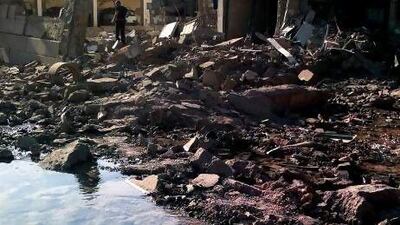DAMASCUS // A suicide car bomb rocked the Kurdish city of Qamishli yesterday, state television said, in the first such attack in Syria's Kurdish region, which has kept out of the conflict between rebels and the regime.
Government forces and rebels, meanwhile, pressed on with the battle for the northern city of Aleppo - the main battleground since July of Syria's 18-month conflict.
The broadcaster said at least four people were killed in the Qamishli blast, while the Syrian Observatory for Human Rights said eight members of the security forces were killed and that the attack targeted their headquarters in the city.
"A suicide terrorist using a car laden with explosives attacked the western district of Qamishli," the television said.
The Britain-based Observatory said "at least eight members of the security forces were killed, and 15 were injured," adding that the blast was followed by heavy gunfire.
The Qamishli attack comes less than a week after a twin bomb attack struck the heavily-guarded Syrian army headquarters in the heart of Damascus, killing at least four of its guards. An Islamist rebel group claimed the Damascus attack.
Yesterday's bombing was the first time since the outbreak of the anti-regime revolt that Qamishli witnessed such a violent attack, Observatory director Rami Abdel Rahman said.
"The earth shook beneath us, the force of the explosion was immense," an activist who identified himself as Serdar told AFP via the Internet.
Mr Abdel Rahman said the military pulled out of Kurdish regions in north-eastern Syria, including Qamishli, several months ago and the rebel Free Syrian Army (FSA) had no presence in the city, although some other fighters are based there.
The Qamishli blast came as intense fighting swept Syria's second city Aleppo after a night of heavy shelling that destroyed houses and killed at least three people, including two civilians, said the Observatory.
Aleppo has been gripped by fighting on an unprecedented scale since Thursday and the Observatory, which relies on a network of activists on the ground, said that rebel mortar fire damaged two helicopters at the area's Al Nairab military airport.
The country's commercial capital and largest city, Aleppo is home to some 3 million people and was once a bastion of support for President Bashar Al Assad. But the city has been hit by fierce fighting since rebels launched an offensive there in July.
Sana, the government news agency said Mr Al Assad's troops have carried out a "successful operation" in western Aleppo against "terrorist gatherings" - a reference to the fighting trying to topple the regime.
Sana said several rebels had been killed or wounded in the violence, but gave no other details.
On Saturday, a fire sparked by battles between Assad's troops and rebels tore through Aleppo's centuries-old covered market, one of the best-preserved bazaars in the Middle East. It was the worst blow yet to the city's historic center and to a UNESCO World Heritage site in Syria.
The heightened violence in Aleppo drew criticism from the city's industrialists of "insufficient" government protection provided to factories and other businesses in the area.
At least 66 people killed yesterday, according to the Obervatory.
Turkish Prime Minister Recep Tayyip Erdogan, a one-time ally of President Bashar Al Assad turned critic of his regime, reiterated yesterday that China, Iran and Russia must stop aiding the Damascus regime.
"Please rethink your current attitude. History will not forgive those who have sided with these brutal regimes," Mr Erdogan said in a speech at a congress of his ruling Justice and Development Party.
Russia, a traditional Damascus ally, and China have blocked all UN Security Council resolutions on the conflict that according to activists has now left around 30,000 people dead in 18 months. The UN puts the toll at 20,000.
Shiite-led Iran is Syria's closest regional ally and is accused by several western and Sunni-led Arab nations of providing military aid to Mr Al Assad's regime.
Turkey backs the Syrian rebels and Erdogan said it is also hosting about 91,000 refugees from the conflict in several border camps.
Meanwhile, UN spokesman Khaled Al Masri said Mokhtar Lamani, the head of UN-Arab League peace envoy Lakhdar Brahimi's office in Syria, met with an FSA commander in central Syria.
Mr Lamani held talks with Colonel Kassem Saadeddine in the town of Talbisseh, Homs province, and other members of the FSA, which is made up of army deserters and civilians who have taken up arms against Assad's regime.
Separately, Iraq's Foreign Minister Hoshyar Zebari vowed his country would stop and search any flights from Iran over its territory suspected of carrying weapons to Syria.
"We have assured US officials that the Iraqi government is determined to land (Iranian) flights and carry out random searches," Zebari said, quoted by Arabic daily Al-Hayat.
Last week, US secretary of state Hillary Clinton pushed Baghdad to deliver on pledges to stop such flights during a meeting with Iraqi Vice President Kudayr Al Khuzaie.

